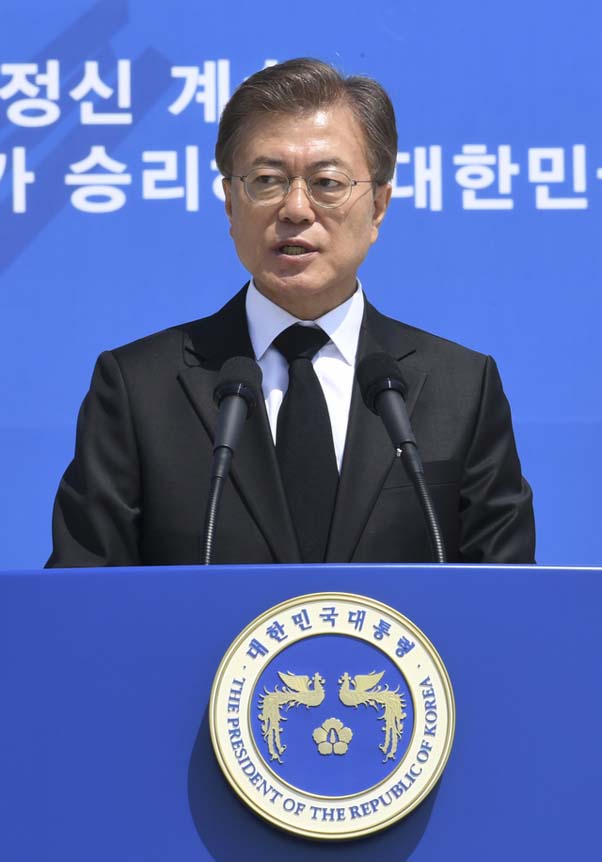
AP, Seoul :
South Korea’s new liberal president vowed Thursday to reopen an investigation into the government’s role in the violent suppression of a 1980 democratic uprising in the city of Gwangju that killed hundreds, as he further distanced himself from his ousted conservative predecessor.
An emotional President Moon Jae-in made the comments during an event in Gwangju marking the anniversary of the massacre, which he called the “saddest and most painful moment” in the country’s recent history.
Moon is the first president to attend the anniversary in four years. Former President Park Geun-hye, the daughter of military dictator Park Chung-hee who ruled the country in the 1960s and ’70s, avoided the event after attending during her first year as president in 2013.
Former military strongman Chun Doo-hwan, who seized power months after Park’s death in 1979, was convicted in 1996 on a broad range of criminal charges, including bribery, treason and orchestrating the crackdown on the Gwangju protesters. He was pardoned in late 1997 and denied responsibility for the bloody crackdown in a memoir published in March, saying he never ordered his troops to fire at the protesters.
Moon wiped away tears as he listened to a speech by a daughter of one of the Gwangju victims and unexpectedly stepped up the stage as she left. In a speech, Moon promised a more thorough investigation into the actions of Chun’s soldiers, including their alleged use of a military helicopter to fire with a machine gun at protesters.
“The new government will invest greater effort into fully revealing the truth surrounding the May 18 democracy movement,” Moon said. “We will at any cost unveil the truth and responsibilities behind the shootings.”
Government figures show about 200 people were killed during the suppression, which involved police, paratroopers and tanks dispatched by Chun, but activists say the actual toll was much higher.
Moon, a longtime human rights attorney, took office on May 10 after winning an election to replace Park, who was removed from office and arrested in March over allegations of corruption and abuse of power that could potentially send her to jail for life.
In another move that symbolized a sharp break from past conservative governments, Moon led the crowd of thousands in singing “March Song for My Dear,” a 1980s protest song that became an anthem for the country’s struggle toward democracy and has often been sung at protests.
All participants in the government-organized anniversary events for the Gwangju uprising had been asked to sing the song before 2008, when the government of conservative former President Lee Myung-bak ended the policy, saying the song was discomforting for people with conservative views. This left choirs to sing the song instead.
South Korea’s new liberal president vowed Thursday to reopen an investigation into the government’s role in the violent suppression of a 1980 democratic uprising in the city of Gwangju that killed hundreds, as he further distanced himself from his ousted conservative predecessor.
An emotional President Moon Jae-in made the comments during an event in Gwangju marking the anniversary of the massacre, which he called the “saddest and most painful moment” in the country’s recent history.
Moon is the first president to attend the anniversary in four years. Former President Park Geun-hye, the daughter of military dictator Park Chung-hee who ruled the country in the 1960s and ’70s, avoided the event after attending during her first year as president in 2013.
Former military strongman Chun Doo-hwan, who seized power months after Park’s death in 1979, was convicted in 1996 on a broad range of criminal charges, including bribery, treason and orchestrating the crackdown on the Gwangju protesters. He was pardoned in late 1997 and denied responsibility for the bloody crackdown in a memoir published in March, saying he never ordered his troops to fire at the protesters.
Moon wiped away tears as he listened to a speech by a daughter of one of the Gwangju victims and unexpectedly stepped up the stage as she left. In a speech, Moon promised a more thorough investigation into the actions of Chun’s soldiers, including their alleged use of a military helicopter to fire with a machine gun at protesters.
“The new government will invest greater effort into fully revealing the truth surrounding the May 18 democracy movement,” Moon said. “We will at any cost unveil the truth and responsibilities behind the shootings.”
Government figures show about 200 people were killed during the suppression, which involved police, paratroopers and tanks dispatched by Chun, but activists say the actual toll was much higher.
Moon, a longtime human rights attorney, took office on May 10 after winning an election to replace Park, who was removed from office and arrested in March over allegations of corruption and abuse of power that could potentially send her to jail for life.
In another move that symbolized a sharp break from past conservative governments, Moon led the crowd of thousands in singing “March Song for My Dear,” a 1980s protest song that became an anthem for the country’s struggle toward democracy and has often been sung at protests.
All participants in the government-organized anniversary events for the Gwangju uprising had been asked to sing the song before 2008, when the government of conservative former President Lee Myung-bak ended the policy, saying the song was discomforting for people with conservative views. This left choirs to sing the song instead.

